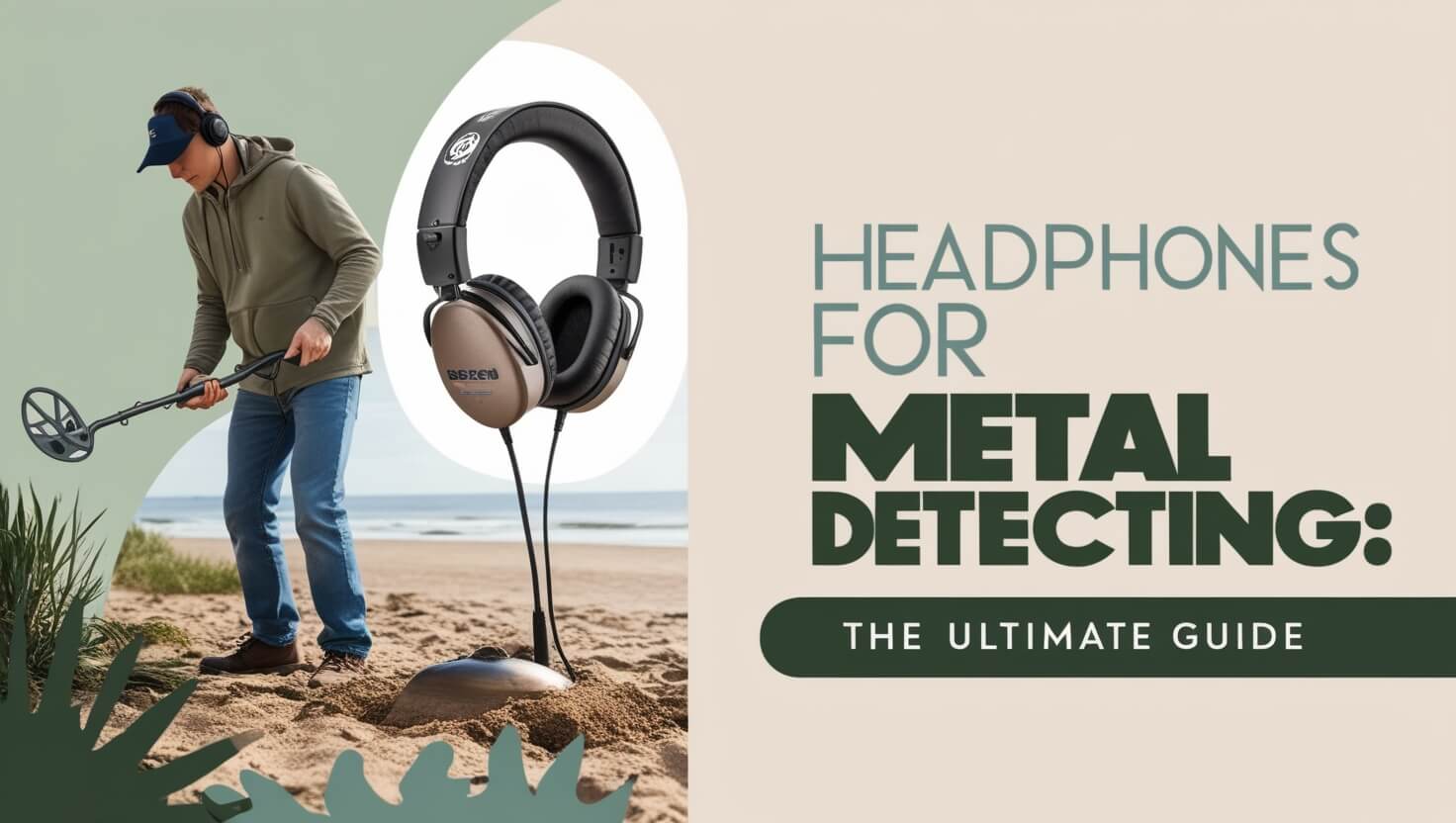
Metal detecting is an exciting hobby, but to get the most out of it, you need the right gear. Headphones are a crucial tool for metal detecting, helping you hear faint signals and identify targets more accurately. This guide will cover everything you need to know about choosing and using headphones for metal detecting.
Why Use Headphones for Metal Detecting?
Headphones aren’t just an accessory; they’re a game-changer for metal detectorists. Here’s why:
Enhanced Audio Perception
When you’re out in the field, ambient noise can mask the subtle tones your detector produces. Headphones block out these distractions, letting you focus on the important sounds. You’ll hear faint signals that might otherwise go unnoticed, potentially leading to more finds.
Improved Target Identification
Different metals produce different tones. With headphones, you can pick up on these nuances more easily. This improved audio clarity helps you decide whether to dig or move on, saving time and energy.
Noise Isolation
Let’s face it: constant beeping can annoy others around you. Headphones keep the noise to yourself, making you a more considerate detectorist in public spaces. Plus, they help you concentrate without disturbing wildlife or other people enjoying the outdoors.
Battery Conservation
Many detectors have built-in speakers, but these drain the battery faster. By using headphones, you can extend your detecting sessions without worrying about running out of power.
Types of Headphones for Metal Detecting
Not all headphones are created equal when it comes to metal detecting. Let’s explore the main types:
Wired Headphones
Wired headphones are the traditional choice for many detectorists. They offer reliable sound quality and don’t require charging. However, the cord can sometimes get in the way during your search.
Pros:
- No need for batteries
- Generally more affordable
- Consistent sound quality
Cons:
- Cable can snag on bushes or your equipment
- Limited range of motion
Wireless Headphones
Wireless technology has come a long way, and many detectorists now prefer the freedom it offers. These headphones connect to your detector via Bluetooth or other wireless technologies.
Pros:
- No cords to tangle
- Greater freedom of movement
- Often comfortable for long sessions
Cons:
- Need regular charging
- Can be more expensive
- Potential for signal interference
Waterproof Headphones
For beach hunters or those who detect near water, waterproof headphones are a must. They’re designed to withstand moisture and even full submersion in some cases.
Pros:
- Can be used in wet conditions
- Often more durable overall
- Great for beach or shallow water detecting
Cons:
- Usually more expensive
- May have limited features compared to non-waterproof models
Key Features to Look for in Metal Detecting Headphones
When shopping for headphones, keep these features in mind:
Sound Quality and Frequency Response
Good metal detecting headphones should have a wide frequency response. This helps you hear both high and low tones clearly, which is crucial for identifying different types of metals.
Comfort and Fit
You might wear your headphones for hours at a time. Look for padded ear cups and an adjustable headband. Some detectorists prefer lighter models for long sessions.
Durability and Weather Resistance
Metal detecting often happens outdoors in various weather conditions. Choose headphones that can stand up to dust, moisture, and temperature changes.
Volume Control
Individual volume controls for each ear can be helpful. They allow you to adjust the sound based on your hearing needs or to keep one ear open to your surroundings.
Compatibility with Your Metal Detector
Make sure the headphones you choose are compatible with your detector. Some detectors require specific connectors or have proprietary wireless systems.
Top Headphones for Metal Detecting: Reviews and Comparisons
Let’s look at some popular options across different price ranges:
Best Budget-Friendly Options
- DetectorPro Gray Ghost Original: These affordable headphones offer good sound quality and are compatible with most detectors.
- Garrett Clear Sound Easy Stow: Lightweight and foldable, these are great for detectorists on the go.
Mid-Range Headphones for Serious Hobbyists
- Gray Ghost Amphibian II: These versatile headphones work well in various conditions and offer excellent sound quality.
- Nokta Makro Waterproof Headphones: A solid choice for those who often detect near water.
High-End Headphones for Professional Detectorists
- Garrett MS-3 Wireless Z-Lynk: These wireless headphones offer top-notch sound quality and zero delay.
- XP DEUS WS5: Designed for the XP DEUS detector, these headphones provide exceptional audio clarity.
Best Waterproof Headphones for Beach and Underwater Detecting
- Garrett Submersible Headphones: These fully waterproof headphones are perfect for underwater detecting.
- Minelab Equinox Waterproof Headphones: Designed specifically for the Minelab Equinox series, these headphones perform well in wet conditions.
How to Choose the Right Headphones for Your Metal Detecting Needs
Selecting the perfect headphones depends on several factors:
Assessing Your Detecting Environment
Consider where you’ll be detecting most often. If you’re often at the beach, waterproof headphones are a smart choice. For wooded areas, wireless models might be better to avoid snagging.
Considering Your Metal Detector Model
Some detectors work best with specific headphones. Check your detector’s manual or the manufacturer’s website for recommendations.
Evaluating Your Budget
While it’s tempting to go for the most expensive option, there are quality headphones at every price point. Balance your budget with your needs and how often you’ll be detecting.
Weighing Wired vs. Wireless Options
Think about your detecting style. If you move around a lot or dislike cords, wireless might be worth the extra cost. If you prefer reliability and don’t mind a cord, wired options are still excellent choices.
Proper Care and Maintenance of Metal Detecting Headphones
To get the most out of your headphones, take good care of them:
Cleaning and Storage Tips
- Wipe down your headphones after each use, especially if you’ve been in dusty or salty environments.
- Store them in a cool, dry place when not in use.
- For wireless models, keep them charged and ready for your next outing.
Extending the Lifespan of Your Headphones
- Avoid extreme temperatures, which can damage the electronics.
- Don’t yank on cords when unplugging wired headphones.
- Replace ear pads when they start to wear out.
Troubleshooting Common Issues
- No sound? Check your connections and volume settings.
- Muffled audio? Clean the speakers and check for debris.
- Wireless headphones not connecting? Try resetting them or your detector.
Enhancing Your Metal Detecting Experience with Headphones
Using headphones effectively can greatly improve your detecting:
Techniques for Better Audio Interpretation
- Practice listening for subtle differences in tones.
- Try adjusting the volume to find the sweet spot for hearing faint signals.
- Some detectorists prefer to use only one ear cup to stay aware of their surroundings.
Using Headphones to Pinpoint Targets
Many detectors have a pinpoint mode. With headphones, you can hear the subtle changes in tone as you zero in on a target’s exact location.
Balancing Headphone Use with Environmental Awareness
While headphones help you focus, it’s important to stay aware of your surroundings. Consider using an open-back design or keeping one ear free in busy or potentially dangerous areas.
Frequently Asked Questions About Metal Detecting Headphones
Can I use regular headphones for metal detecting?
While you can use regular headphones, they’re not ideal. Metal detecting headphones are designed to handle the specific audio signals produced by detectors and often have features like waterproofing that regular headphones lack.
Are wireless headphones reliable for metal detecting?
Modern wireless headphones for metal detecting are quite reliable. Many use special technologies to minimize lag and interference. However, they do require charging, which is something to keep in mind for long detecting sessions.
How do I connect headphones to my metal detector?
This varies by detector model. Most have a standard 1/4″ jack, but some use proprietary connectors. Check your detector’s manual for specific instructions.
What’s the difference between mono and stereo headphones for metal detecting?
Mono headphones produce the same sound in both ears, which some detectorists prefer for simplicity. Stereo headphones can provide different sounds to each ear, which can be useful for more advanced target identification.
Conclusion
Choosing the right headphones for metal detecting can significantly improve your treasure hunting experience. From enhancing audio perception to helping you identify targets more accurately, good headphones are an essential tool for any serious detectorist.
Remember to consider your specific needs, including your detecting environment, your detector model, and your budget. Whether you opt for wired or wireless, waterproof or standard, the key is to find headphones that work well for you and your detecting style.
With the right pair of headphones, you’ll be well-equipped to hear those faint signals that might lead to your next great find. Happy hunting!






